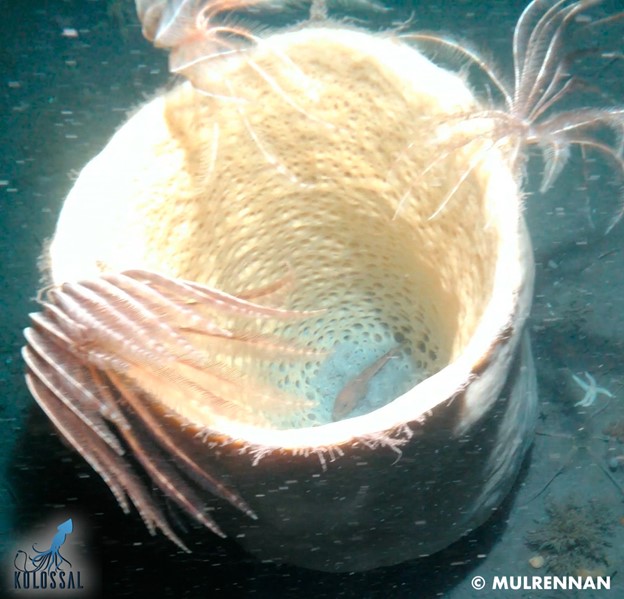The colossal squid (Mesonychoteuthis hamiltoni) is one of the ocean’s biggest mysteries. There are no photographs and no footage of a living colossal squid in its natural habitat. What we do know about this ocean beast is learnt from the few specimens that have been found in fishing nets or washed up on beaches.
An international research team has come up with the ambitious plan to find and study the colossal squid in its natural home by 2025, the 100-year anniversary of the discovery of the species. Between December 2022 and March 2023, the team traveled to Antarctica four times to attempt to find the colossal squid. They used a polar tourism vessel called the Ocean Endeavor fitted with a deep-sea camera system that could be lowered to a maximum depth of 400 meters (1,312 feet).
The colossal squid is thought to measure 14 meters (46 feet) and weighs at least 500 kilograms (1,100 pounds). It is a multiple world record holder, taking the title for the world’s largest invertebrate (in terms of weight at least). This elusive species is thought to live in the deep sea in the Southern Ocean surrounding Antarctica.
While the team did not manage to find an adult, they have captured footage of a glass squid that measures 10-12 centimeters (3.9-4.7 inches). This footage is currently under analysis and could show either an unknown species, an adult Galiteuthis glacialis squid, or the first footage of a small juvenile colossal squid ever recorded. It appears at 2 minutes 33 seconds in the below video.
“The colossal squid is an oversized poster species for how little we know about the ocean,” said Matt Mulrennan, Marine Scientist, the leader of the four 2022-2023 expeditions and Founder/CEO of non-profit Kolossal, in a statement sent to IFLScience.
Glass squids are scientifically known as the family Cranchiidae, to which both the colossal squid and the Galiteuthis glacialis species belong. These are the only known Cranchidae that live in these Antarctic conditions.
“The two known Cranchiidae taxa seen in the Antarctic are Galiteuthis glacialis and Mesonychoteuthis hamiltoni. The squid seen here could belong to different life stages of either of those taxa – and is an exciting example of wild cranchiid behavior, as I cannot think of existing video footage of either of those squid in their natural environment,” said Dr Aaron Evans, who studies the Cranchiidae family and has been peer reviewing the footage.
The footage shows large amounts of marine snow, which is organic matter falling into the deep ocean; this obscures the view of the mystery squid as it appears.
“Identification of glass squids from footage can be tricky; some species have unique combinations of visible features, but other groups of species look similar enough that it’s very hard to confirm who they are from images alone,” said Dr Kat Bolstad of Auckland University of Technology (AUT), who is an expert on the colossal squid and has also been reviewing the footage.
As well as the squid footage, the team filmed a whole range of other deep-sea creatures – more than 80 different species, including giant volcano sponges, Antarctic sunflower stars, and multiple species of tunicates, soft corals, siphonophores, and crinoids.

Giant volcano sponges are thought to be among the world’s oldest living animals, estimated to live for up to 15,000 years.
Image credit: © KOLOSSAL / MULRENNAN
“This glass squid observation adds to the 100 years of mystery surrounding the search for the colossal squid, as the true identification may ultimately never be settled. But during these exciting expeditions we also engaged many people – from students to retirees – about the spirit of ocean exploration and we found that Antarctica’s remote watery depths are alive, unique, and worthy of protection,” concluded Mulrennan.
Source Link: "Mystery" Glass Squid In Antarctica Could Be First Ever Colossal Squid Baby Filmed